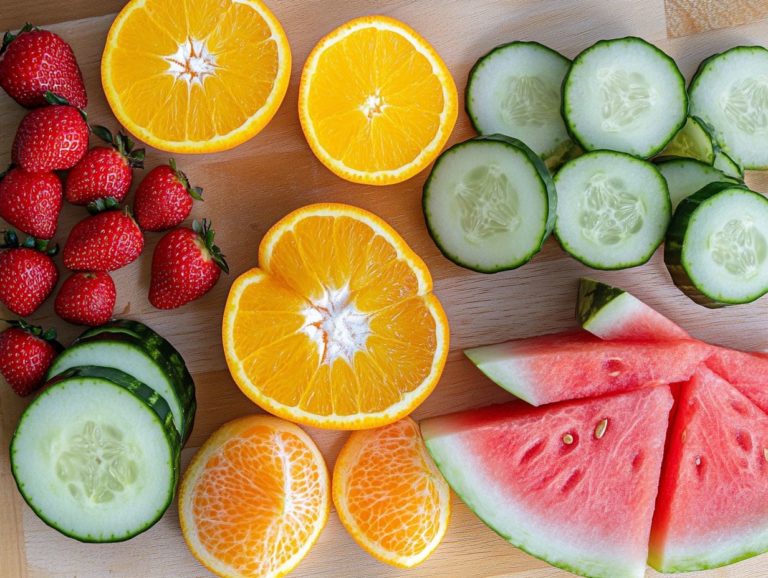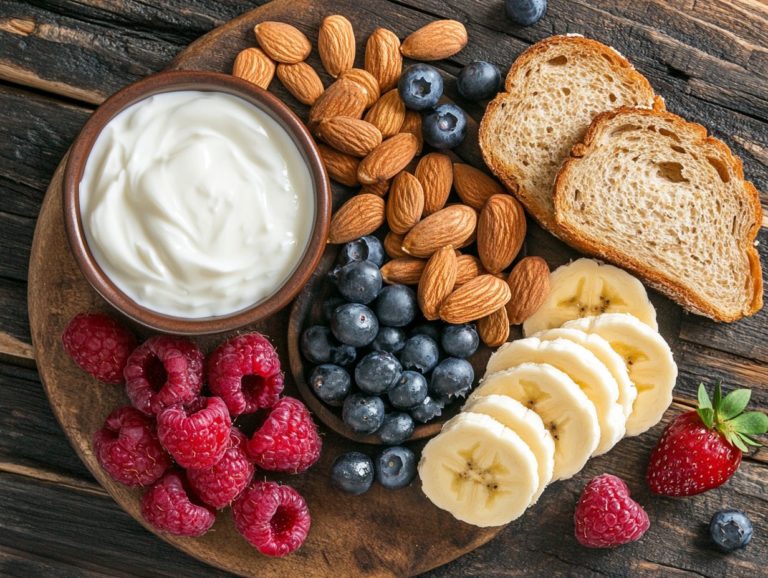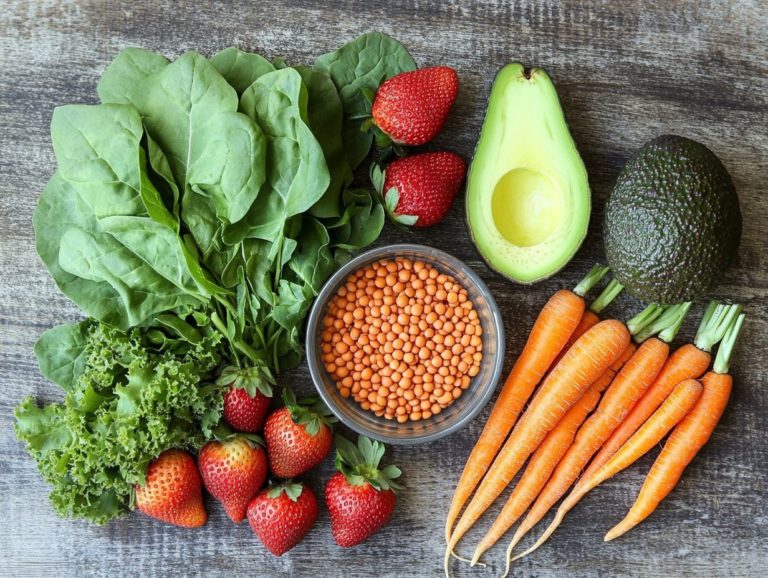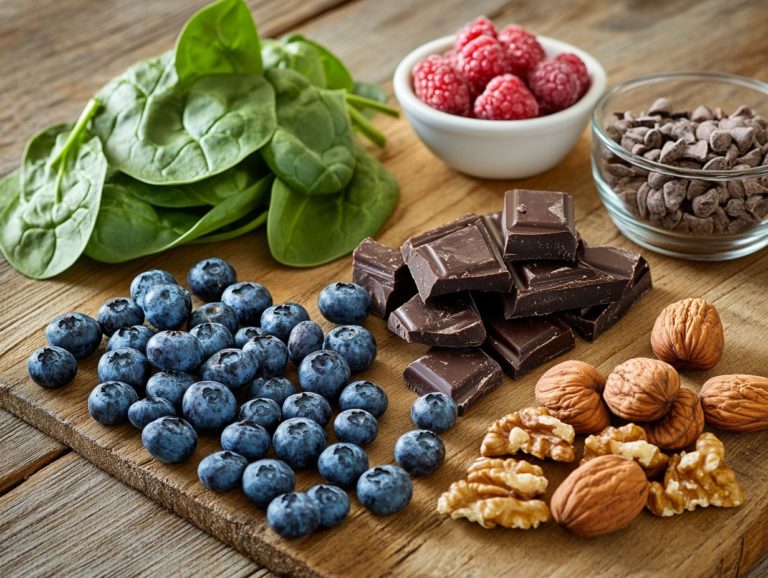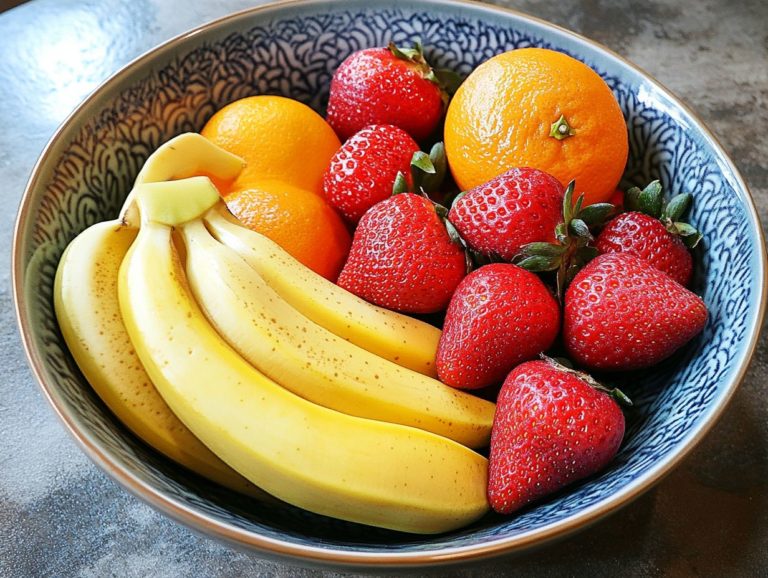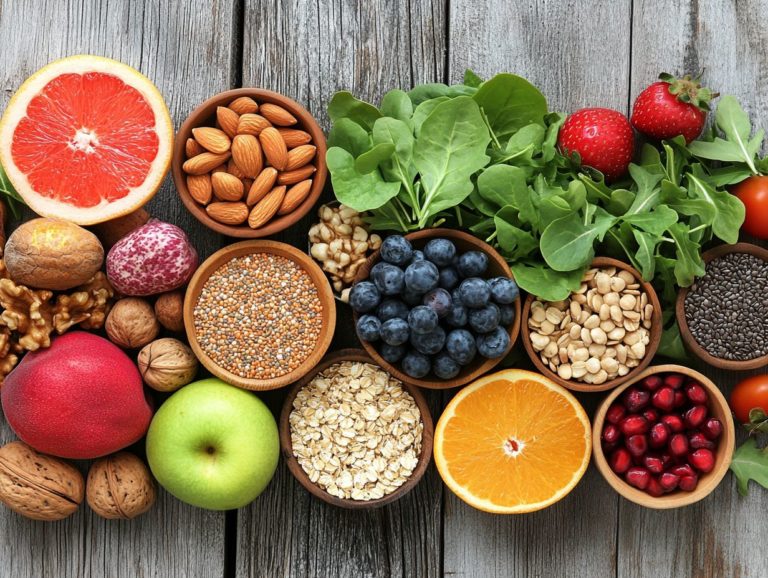Top 10 Food Sources of Selenium
Selenium is an essential mineral that significantly supports your health. It plays a crucial role in immune function and promotes optimal thyroid health.
You’ll be pleased to know that certain foods can boost your selenium intake significantly.
This guide explores the top 10 food sources of selenium, featuring tasty options like Brazil nuts, fish, and whole grains.
It outlines daily selenium requirements, highlights the benefits of this mineral, and offers practical tips for incorporating these foods into your diet while avoiding potential risks.
Whether you’re eager to enhance your nutrition or curious about selenium, this guide equips you with everything you need!
Contents
- Key Takeaways:
- 1. Brazil Nuts
- 2. Fish and Shellfish
- 3. Whole Grains
- 4. Eggs
- 5. Chicken and Turkey
- 6. Sunflower Seeds
- 7. Mushrooms
- 8. Spinach
- 9. Garlic
- 10. Dairy Products
- How Much Selenium Do You Need Daily?
- Frequently Asked Questions
- 1. What are the top 10 food sources of selenium?
- 2. How much selenium do these top 10 food sources contain?
- 3. Can these top 10 food sources meet my daily selenium needs?
- 4. Are there any health benefits of consuming these top 10 food sources of selenium?
- 5. Can I consume too much selenium from these top 10 food sources?
- 6. Are there other sources of selenium besides these top 10 food sources?
Key Takeaways:
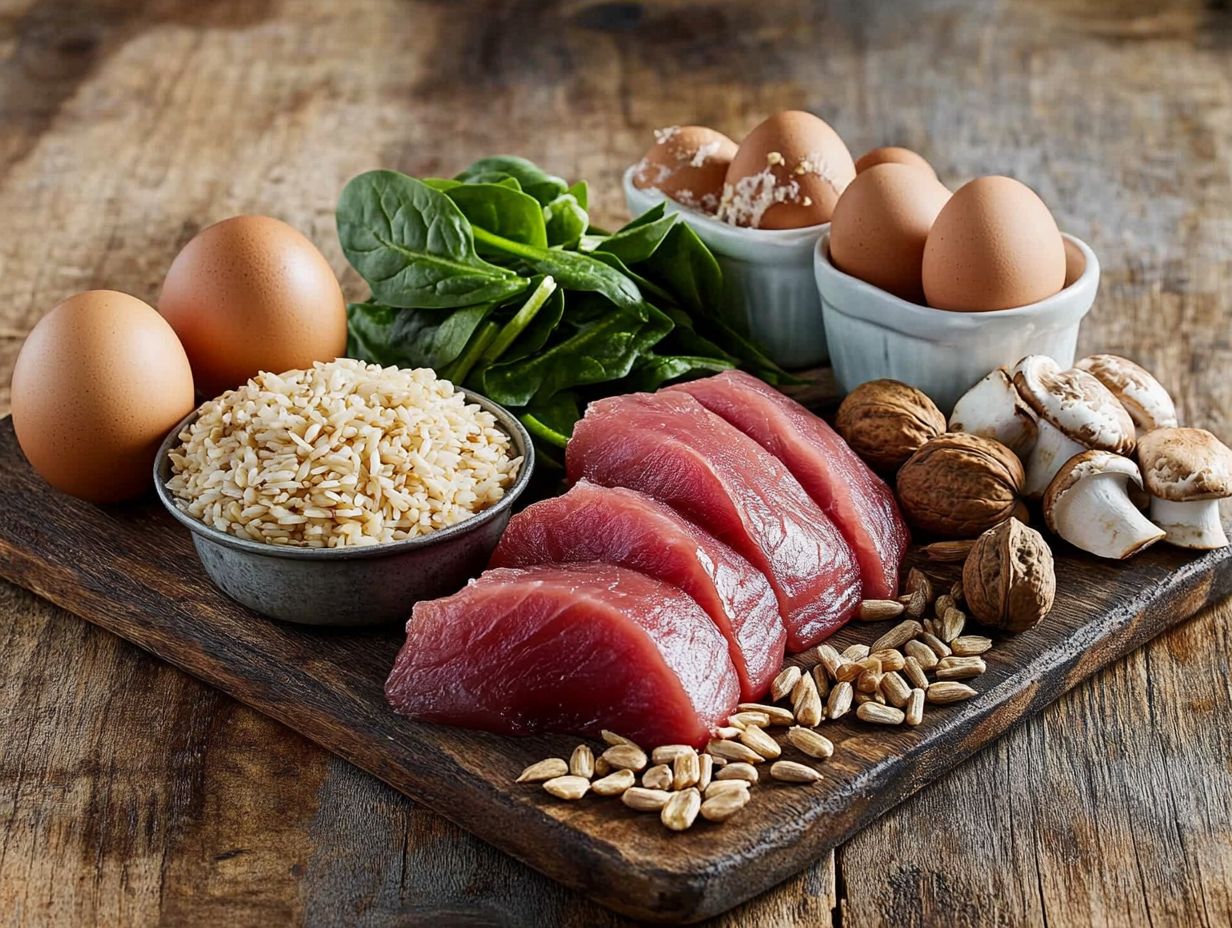
Brazil nuts are the top source of selenium, providing over 100% of the recommended daily intake in just one nut. Other great sources include fish, whole grains, and eggs, which can easily fit into a balanced diet.
However, consuming too much selenium can lead to adverse effects. It’s important to be mindful of portion sizes and not rely solely on selenium-rich foods.
1. Brazil Nuts
Brazil nuts are celebrated for their remarkable selenium content. They are an outstanding source of this essential mineral.
Selenium supports numerous bodily functions, including the synthesis of selenoproteins, which are important for antioxidant activities and overall well-being.
Health professionals recommend maintaining adequate selenium levels for enhanced immune function and improved thyroid hormone metabolism.
For instance, glutathione peroxidase a selenoprotein helps neutralize harmful free radicals, reducing oxidative stress in your body.
Incorporating a small serving of Brazil nuts into your diet can be a simple yet effective way to boost your selenium status, especially if you’re lacking it from other sources.
Brazil nuts not only provide a delicious snack option but also act as functional food that aligns perfectly with modern nutritional guidelines.
2. Fish and Shellfish
Fish and shellfish are not just tasty; they are also rich in dietary selenium. This mineral helps maintain optimal plasma levels in your body, aiding in cancer prevention and supporting cardiovascular health.
Consider adding nutrient-dense options like tuna, halibut, sardines, and shrimp to your meals. These varieties elevate flavor and enhance your overall nutrition.
Imagine enjoying grilled tuna steaks with a crisp salad or shrimp saut ed with garlic over whole grain pasta. If you’re leaning toward a Mediterranean diet, canned sardines are a quick, delicious addition to salads or a flavorful spread on whole-grain crackers.
Diversifying your seafood choices can help you meet your recommended dietary intake of selenium while enjoying a delightful array of flavors and health benefits.
3. Whole Grains
Whole grains are a remarkable source of dietary selenium, providing essential nutrients that foster nutritional adequacy.
Incorporating a variety of grains such as brown rice, quinoa, and whole wheat into your meals can significantly enhance a vegetarian diet.
These grains not only supply selenium but also work well with other plant-based foods, improving nutrient absorption.
For example, pairing whole grains with legumes or nuts increases the body’s ability to utilize selenium efficiently.
This thoughtful approach ensures that anyone following a vegetarian lifestyle receives sufficient levels of this essential mineral, boosting immune function and overall well-being while enjoying a diverse culinary experience.
Take Action! Try adding one new selenium-rich food to your diet this week, or consult a nutritionist for personalized dietary advice.
Conclusion: Selenium is vital for your health, and incorporating foods like Brazil nuts, fish, and whole grains can help you achieve optimal levels.
4. Eggs
Eggs are a great source of protein. They offer essential amino acids and boost your selenium intake, which helps your immune system.
Selenium is important for thyroid function, protecting against cell damage, and regulating immune responses. Include eggs in your meals to meet your selenium needs.
Whether you enjoy them scrambled, poached, or in a frittata, eggs fit perfectly into any meal. Pairing them with vegetables or whole grains enhances both flavor and nutrition.
This means you re not just enjoying delicious dishes; you re also getting the micronutrients your body needs every day.
5. Chicken and Turkey
Chicken and turkey are popular lean protein choices that provide a substantial amount of selenium, essential for your overall health.
These poultry options are key in various diets, whether Mediterranean, ketogenic, or balanced. Including chicken or turkey in your meals significantly boosts your selenium intake, crucial for a healthy immune system.
If you re cutting back on red meat, these lean proteins offer a tasty alternative, helping you meet your nutritional needs while enjoying a variety of delicious meals.
6. Sunflower Seeds
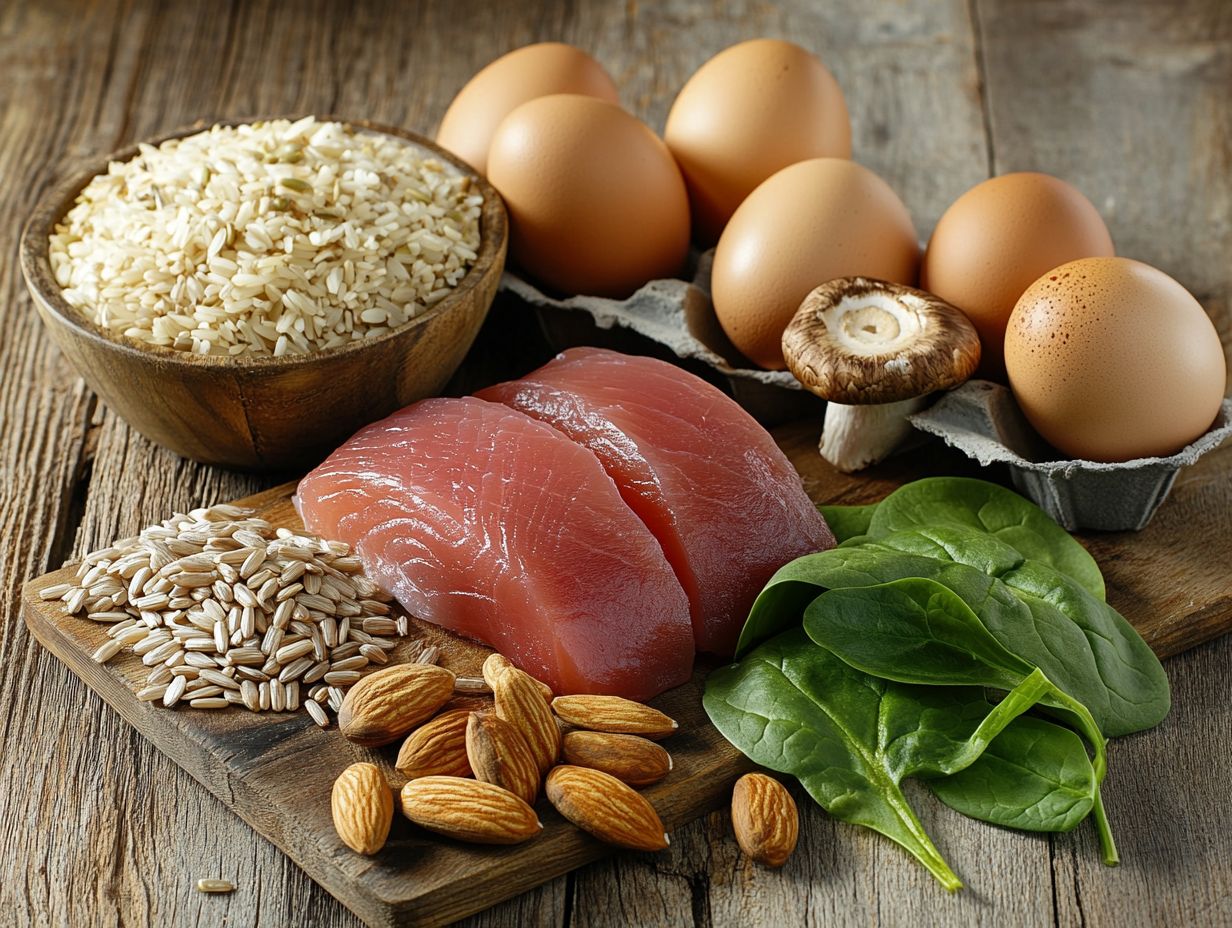
Sunflower seeds are an excellent snack choice, providing a good dose of selenium along with healthy fats.
These seeds are easy to add to your meals. Toss them into salads, blend them into smoothies, or mix them into trail mixes for added flavor and nutrition.
As a rich source of selenium, sunflower seeds support immune function and promote heart health. Whether you add them to oatmeal or energy bars, they complement various diets well.
7. Mushrooms
Mushrooms are not just tasty; they re a great source of selenium and offer antioxidant benefits that aid your immune system.
Varieties like shiitake, button, and portobello pack a selenium punch, making them fantastic additions to your meals. You can saut , grill, or blend them into soups for added flavor and nutrition.
Adding mushrooms to your diet is simple. Toss them into salads, stir them into pasta, or mix them with vegetables to increase your selenium intake and promote better health.
8. Spinach
Spinach is a healthy leafy green that may not be the highest in selenium, but it offers a wealth of antioxidants for overall health.
It s especially beneficial for those following vegetarian diets, as it provides essential vitamins like A, C, and K, plus important minerals.
Spinach pairs well with other selenium-rich foods like Brazil nuts, sunflower seeds, and mushrooms, enhancing both flavor and nutrition.
By combining spinach with these ingredients, you can easily meet your dietary recommendations while enjoying tasty meals.
This combination not only elevates your dishes but also supports your overall wellness, making spinach a valuable addition to your cooking.
9. Garlic
Garlic isn t just a culinary superstar; it also offers potential health benefits. Packed with dietary selenium, it enhances antioxidant properties and helps your body fight illness.
Incorporating this versatile gem into your daily meals is easy. Try adding minced garlic to saut ed vegetables, drizzling it over roasted meats, or blending it into salad dressings for a delightful punch of flavor.
Garlic also contains rich sulfur compounds that add to its anti-inflammatory and antimicrobial benefits. This makes it a fantastic addition to a balanced diet, offering not just bold taste but a wealth of nutrients that can elevate your overall health.
Try experimenting today with fresh garlic, garlic powder, or infused oils to boost both the flavor and nutritional value of your dishes!
10. Dairy Products
Dairy products, such as milk, cheese, and yogurt, are essential sources of dietary selenium and protein. They play a crucial role in achieving nutritional adequacy and delivering vital nutrients like calcium.
These foods enhance bone health through their calcium content. They also support immune function and thyroid health, thanks to their selenium levels. By including a variety of dairy products in your meals, you can easily meet your dietary intake recommendations.
Options like fermented yogurts or nutrient-dense cheeses can enrich your diet. This balanced approach ensures that selenium, along with other critical nutrients, contributes positively to your overall health and well-being.
How Much Selenium Do You Need Daily?
Determining your daily selenium requirements is crucial for maintaining optimal health. Health professionals base their recommendations on dietary reference guidelines set forth by the National Academies of Sciences, Engineering, and Medicine.
These guidelines suggest that adults generally need about 55 micrograms of selenium each day. Pregnant and lactating women may require 60 to 70 micrograms to support maternal well-being and fetal development.
Ensuring adequate selenium intake is vital, not just for its antioxidant properties but also for its essential roles in thyroid function and immune health.
Your dietary choices significantly influence your ability to meet these intake levels. Incorporating foods like Brazil nuts, seafood, and whole grains can help you easily achieve your selenium needs while enjoying a diverse and balanced diet.
What Are the Health Benefits of Selenium?
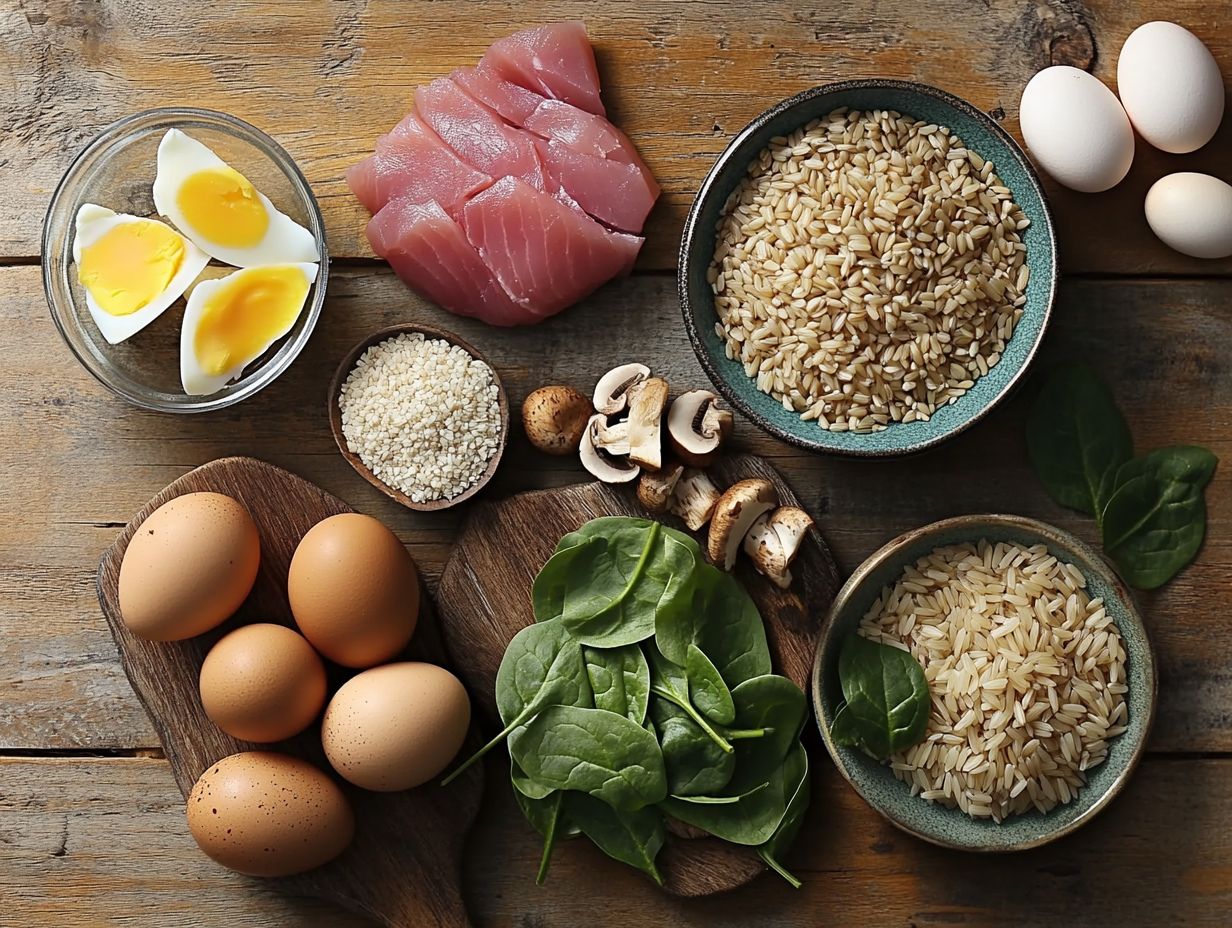
Selenium offers numerous health benefits, particularly through its powerful antioxidant properties. These properties support your immune system and may reduce the risk of chronic diseases like cancer and heart issues.
Research shows that maintaining adequate selenium levels can boost your body s defenses against oxidative stress, which is linked to various health concerns. People who consume higher amounts of selenium tend to experience enhanced immune function and reduced inflammation.
To optimize your selenium intake, consider adding these selenium-rich foods to your diet:
- Brazil nuts
- Seafood
- Whole grains
These dietary choices not only promote better overall health but also enhance your body s resilience against disease. A balanced intake of selenium is essential for anyone looking to fortify their immune response and support heart health.
What Are the Symptoms of Selenium Deficiency?
Selenium deficiency can lead to various symptoms and health issues, such as Keshan disease and Kashin-Beck disease. This underscores the importance of adequate selenium intake to prevent oxidative damage and maintain overall wellness.
These conditions primarily impact specific populations, particularly those living in selenium-deficient regions or following diets low in this essential mineral. Symptoms may include weakened immune function, fatigue, and skin lesions.
If you have certain medical conditions, such as HIV/AIDS or gastrointestinal disorders, you might be at a higher risk due to malabsorption issues.
Ensuring you get enough dietary selenium from sources like Brazil nuts, seafood, and whole grains is crucial for promoting immune health and reducing the chances of encountering these serious ailments.
How Can One Incorporate Selenium-Rich Foods into Their Diet?
Incorporating selenium-rich foods into your diet can be delightful and healthful. This allows you to enhance your nutrition while enjoying a variety of flavors.
By weaving ingredients like Brazil nuts, fish, and whole grains into your everyday meals, you can effortlessly reap their nutritional benefits.
Picture starting your day with a hearty breakfast of whole grain toast, topped with creamy Brazil nut butter. For lunch, enjoy a quinoa salad featuring grilled salmon and a vibrant mix of vegetables.
For dinner, imagine savoring baked cod, delicately sprinkled with herbs, alongside a pilaf made from brown rice or farro, complemented by steamed broccoli.
These simple yet satisfying recipes make it easy to enjoy selenium while contributing to a well-rounded, nutritious diet.
What Are the Potential Risks of Consuming Too Much Selenium?
While selenium is essential for health, eating too much can lead to selenium toxicity. This happens when you take in too much selenium from high-selenium foods, like Brazil nuts, or from supplements without proper guidance.
Symptoms of toxicity include gastrointestinal disturbances, hair loss, fatigue, and neurological issues. These factors can significantly diminish your quality of life.
Remember, selenium is crucial for your health! A balanced diet helps you get enough without venturing into harmful territory.
By maintaining a varied diet, you can reduce risks associated with both deficiency and excess, ultimately promoting your overall health.
What Are Other Sources of Selenium Besides Food?
Along with exploring food sources, selenium supplements can be a viable option if obtaining adequate selenium through diet alone proves challenging. This is especially true for those undergoing hemodialysis or managing specific health conditions like HIV.
Certain groups, including the elderly and those with gastrointestinal disorders, may struggle with nutrient absorption, making supplementation a sensible choice.
It’s crucial to assess your dietary habits, as a busy lifestyle can create nutritional gaps. Consult healthcare professionals before starting any supplementation regimen to ensure safety and effectiveness.
Frequently Asked Questions
1. What are the top 10 food sources of selenium?
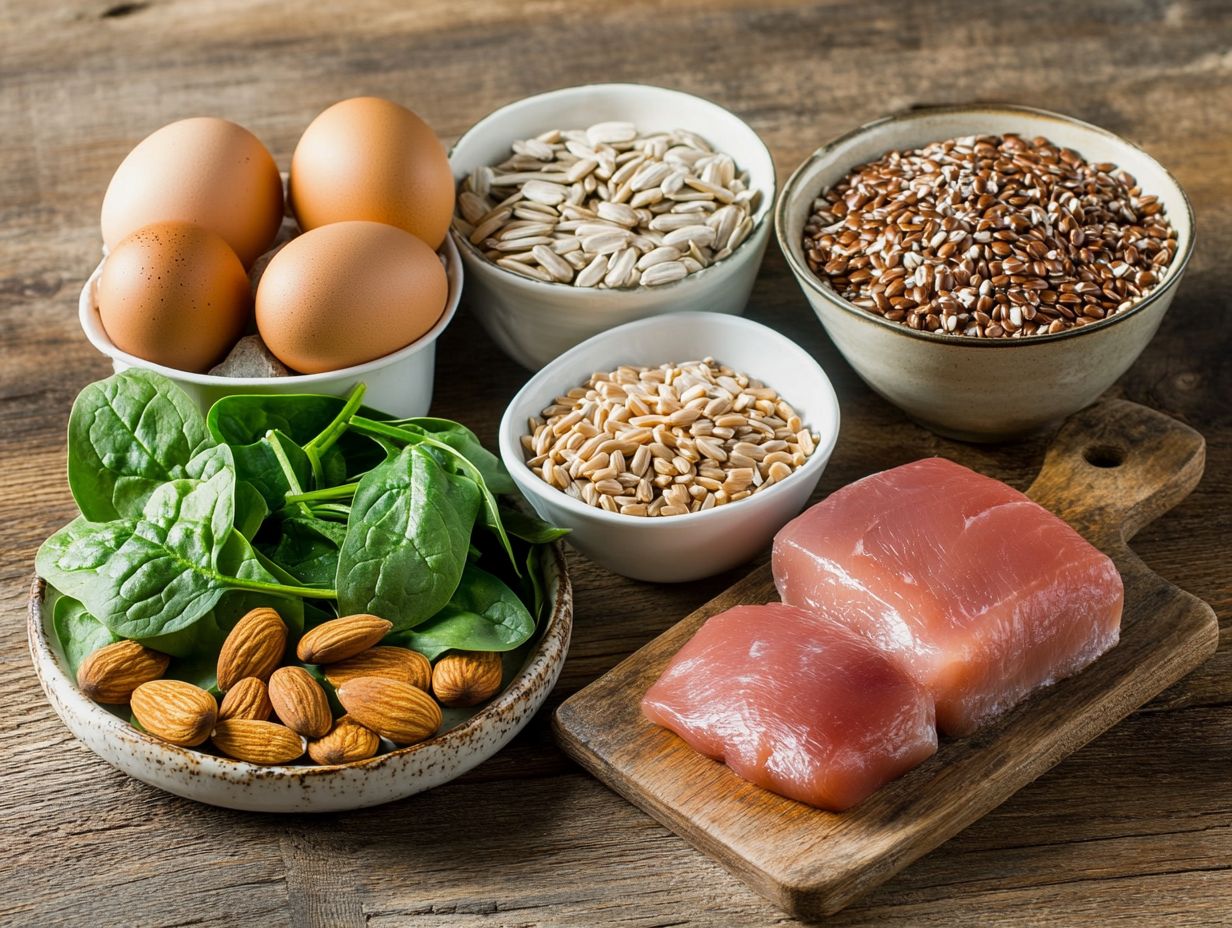
The top 10 food sources of selenium include Brazil nuts, tuna, sunflower seeds, beef, chicken, mushrooms, oats, eggs, spinach, and brown rice.
2. How much selenium do these top 10 food sources contain?
The amount of selenium varies, but on average, Brazil nuts contain about 544 micrograms per ounce. Tuna has 92 micrograms per 3 ounces, sunflower seeds have 19 micrograms per ounce, and mushrooms have 8 micrograms per cup.
3. Can these top 10 food sources meet my daily selenium needs?
Yes, consuming a variety of these food sources can easily meet your daily selenium needs. The recommended daily intake for adults is 55 micrograms per day.
4. Are there any health benefits of consuming these top 10 food sources of selenium?
Yes, selenium plays a crucial role in the immune system, thyroid function, and antioxidant activity. Eating these foods can help improve immune function, regulate thyroid hormones, and protect against cell damage.
5. Can I consume too much selenium from these top 10 food sources?
While selenium is essential for health, consuming too much can be harmful. The tolerable upper intake level for adults is 400 micrograms per day. It is important to eat a varied diet and not rely solely on these food sources for selenium.
6. Are there other sources of selenium besides these top 10 food sources?
Yes! Selenium is also in seafood, meat, poultry, dairy, and grains.
You can also find selenium in supplements, but getting it from food is usually better.

